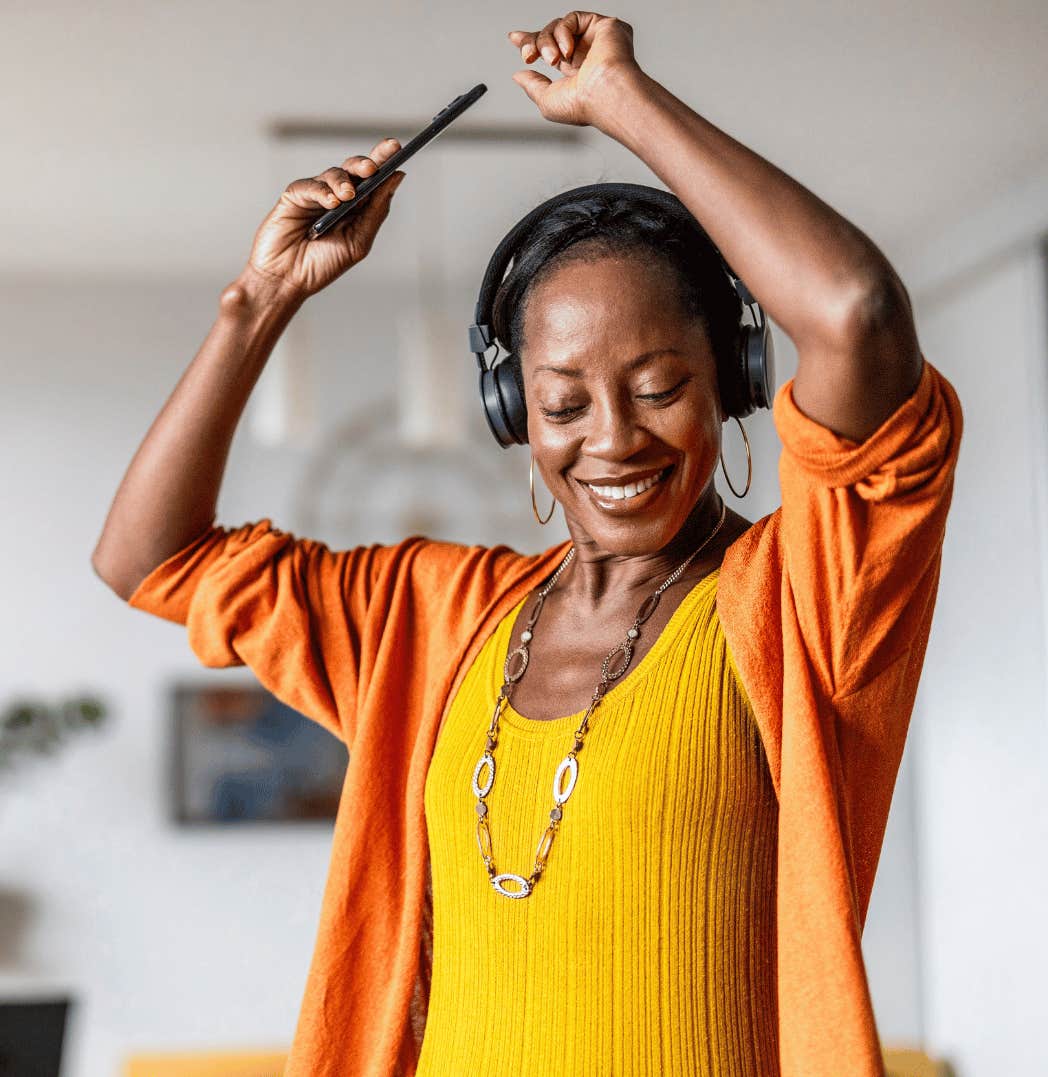New Research On Depression Shows Everyone’s Favorite Exercise Can Be More Effective Than Medication
Everyone from your grandmother to 20-something TikTokers are going to love this news.
 Look Studio via Shutterstock
Look Studio via Shutterstock If you’re feeling depressed and looking for a solution, there are many options: medications, CBT, DBT, somatic therapy and so much more. However, one recent major study discovered that one treatment — exercise — is incredibly effective for people experiencing depression, often more so than medication!
The biggest surprise in the study? It turns out that dancing is likely more effective than any other type of exercise or treatment for helping alleviate symptoms of depression! Yes, really! Of course, you should always consult your healthcare provider before changing your treatment, but the science here seems hopeful.
Exercise is great for depressive symptoms, but one type is particularly helpful — dancing
Many people turn to therapy or medication, but a scientific study shows that physical exercise may be just as good. Dancing as a treatment for depression is particularly effective.
A new study published by BMJ (formerly British Medical Journal) analyzed multiple previous studies to identify the optimal dose and type of exercise for treating major depressive disorder, compared with psychotherapy, antidepressants, and control conditions.
“Exercise is an effective treatment for depression, with walking or jogging, yoga, and strength training more effective than other exercises, particularly when intense,” the authors concluded. Shockingly, dancing was at the very top of that list!
It's important to note that folks experiencing depression should consult their healthcare provider before adding or adjusting any treatments, particularly when it comes to medications. However, pretty much anybody can start dancing and see how it works!
 Pikselstock via Shutterstock
Pikselstock via Shutterstock
Understanding depression as a 'brain state'
“Depression is a brain state and also a pattern of observable behaviors or states of being,” explains Mandy Friedman, LPCC-S, in the Lovefraud podcast, Understanding Depression. Symptoms include feeling a lack of motivation, joy, and engagement in life. In severe cases, it can lead to thoughts of self-harm.
What happens, Friedman says, is your brain gets sick. Depression is neurobiological and chemical, she says, not a character flaw. Genetics is often a big factor.
“There are definite things that can make people predisposed,” Friedman says. “If you don't have a healthy support system if you're not getting good sleep, if your options for nutrition are limited. Medical conditions that cause people to feel depressed can be factors as well.”
The studies
A BMJ study, Effect of exercise for depression: a systematic review and network meta-analysis of randomized controlled trials, led by Michael Noetel reviewed 218 previous studies with a total of 14,170 participants. All of the participants were diagnosed with major depressive disorder. All of the studies were randomized controlled trials that included exercise as a treatment for depression.
Because the study was so large, the authors were able to compare the strengths of various approaches and draw more nuanced conclusions, the authors said.
The study compared exercise to cognitive behavioral therapy (CBT) and medication (selective serotonin re-uptake inhibitors, or SSRIs). It included heavy-duty statistical analysis, and that’s where the findings about dance came in.
“Compared with active controls, large reductions in depression were found for dance, and moderate reductions for walking or jogging, strength training, mixed aerobic exercises, and tai chi or qigong,” the authors wrote (statistics omitted).
“Consistent with other meta-analyses, effects were moderate for cognitive behavior therapy alone and small for SSRIs compared with active controls,” they wrote (statistics omitted).
Dancing's therapeutic benefits
Barbara Field summarized the work of several other researchers who specifically studied the therapeutic benefits of dancing. Some of the benefits that may help people who are dealing with depression include:
- Increase endorphins
- Improves your mood
- Reduces loneliness
- Decreases anxiety and depression
- Decreases rumination
- Improves self-esteem
- Involves social skills
- Reduces pain perception
The article even cited research demonstrating how choreographed dance improves the structure of the brain. In this study, healthy volunteers in their 60s and 70s learned country dancing, with steps that became progressively more challenging. After six months, they had denser white matter in the part of the brain that processes memory. This did not happen with groups of volunteers who walked or did stretching and balance training.
 Gorodenkoff via Shutterstock
Gorodenkoff via Shutterstock
Any type of dance works
When you’re feeling depressed, the last thing you want to do might be go out to a nightclub. So start easy. Turn on some music that you like and dance in your living room or outside in nature. Or try a dancing video game.
Eventually, you may want to take a dance class. This offers multiple benefits — learning specific choreography enhances your brain, as mentioned above. The novelty of doing something new helps you overcome obsession and ruminating. Dance class is also a social activity, so it gets you out among new people with a common interest.
Dancing as a treatment for depression may help you feel better — without meds.
Donna Andersen is a writer and author who offers advice on escape and recovery from sociopaths, psychopaths, or narcissists. She has appeared on TV shows like ABC 20/20 and The Ricki Lake Show, as well as in digital and print media publications like Psychology Today, Marie Claire, Thought Catalog, and Daily Mail.

